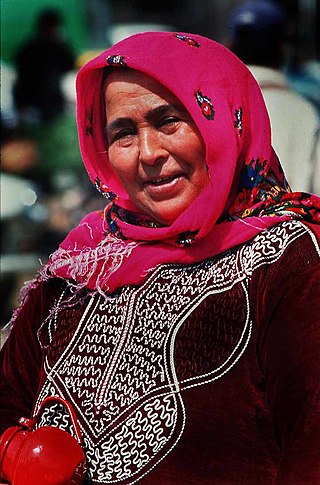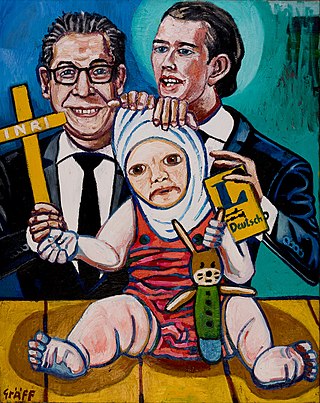Related Research Articles

In modern usage, hijab generally refers to variety of head coverings conventionally worn by many religious Muslim women as an expression of faith. Similar to the mitpaḥat/tichel or snood worn by religious married Jewish women, certain headcoverings worn by some Christian women, such as the mantilla, apostolnik and wimple, and the dupatta favored by many Hindu and Sikh women, the hijab comes in various forms. Often, it specifically describes a scarf that is wrapped around the head, covering the hair, neck, and ears while leaving the face visible. The use of the hijab has grown globally since the 1970s, with many Muslims viewing it as a symbol of modesty and faith; it is also worn as a form of adornment. There is consensus among Islamic religious scholars that covering the head is either required or preferred. In practice, most Muslim women choose to wear it.

The participation of women and girls in sports, physical fitness, and exercise has existed throughout history. However, participation rates and activities vary in accordance with nation, era, geography, and stage of economic development. The modern era of organized sports did not begin to emerge either for women or men until the late industrial age.

Islamic clothing is clothing that is interpreted as being in accordance with the teachings of Islam. Muslims wear a wide variety of clothing, which is influenced not only by religious considerations, but also by practical, cultural, social, and political factors. In modern times, some Muslims have adopted clothing based on Western traditions, while others wear modern forms of traditional Muslim dress, which over the centuries has typically included long, flowing garments. Besides its practical advantages in the climate of the Middle East, loose-fitting clothing is also generally regarded as conforming to Islamic teachings, which stipulate that body areas which are sexual in nature must be hidden from public view. Traditional dress for Muslim men has typically covered at least the head and the area between the waist and the knees, while women's islamic dress is to conceal the hair and the body from the ankles to the neck. Some Muslim women also cover their face. However, other Muslims believe that the Quran strictly mandate that women need to wear a hijab or a burqa.

Islamic feminism is a form of feminism concerned with the role of women in Islam. It aims for the full equality of all Muslims, regardless of gender, in public and private life. Islamic feminists advocate for women's rights, gender equality, and social justice grounded in an Islamic framework. Although rooted in Islam, the movement's pioneers have also utilized secular, Western, or otherwise non-Muslim feminist discourses, and have recognized the role of Islamic feminism as part of an integrated global feminist movement.

In France, there is an ongoing social, political, and legal debate concerning the wearing of the hijab and other forms of Islamic coverings in public. The cultural framework of the controversy can be traced to France's history of colonization in North Africa, but escalated into a significant public debate in 1989 when three girls were suspended from school for refusing to remove their headscarves. That incident, referred to in France as l'affaire du foulard or l'affaire du voile, initially focused the controversy on the wearing of the hijab in French public schools. Because of the wide-ranging social debates caused by the controversy, l'affaire du foulard has been compared to the Dreyfus affair in its impact on French culture.
During the late 20th and early 21st centuries in Iran, women's rights Women’s rights in Iran have faced ongoing challenges, marked by strict laws, cultural norms, and government policies that limit freedoms and enforce gender-based restrictions. Since the 1979 Iranian Revolution, the country’s legal system has imposed a conservative interpretation of Islamic law, or Sharia, which directly affects women’s rights in several areas. .The World Economic Forum's 2017 Global Gender Gap Report ranked Iran 140, out of 144 countries, for gender parity. In 2017, in Iran, females comprised just 19% of the paid workforce, with seven percent growth since 1990. In 2017, the Georgetown Institute for Women, Peace and Security (WPS) Index ranked Iran in the bottom tercile of 153 countries. Compared to other South Asian regions, women in Iran have a better access to financial accounts, education, and cellphones. Iran was ranked 116, out of the 153 countries, in terms of legal discrimination against women.

Women's football in Iran is very popular. Football has been a part of life for Iranians for many decades now and is played in schools, alleys, streets and football clubs nationwide. Women in Iran are increasingly inclined to play football, and with this increasing popularity it is only a matter of time before a more secure infrastructure develops. The Iran women's national football team competes internationally.
The Women's Islamic Games, also called the Muslim Women's Olympics, were an international multi-sport event started in 1993. The event was organised by the Islamic Federation of Women's Sport. Muslim women of all nationalities were allowed to take part in the Games.

Various styles of head coverings, most notably the khimar, hijab, chador, niqab, paranja, yashmak, tudong, shayla, safseri, carşaf, haik, dupatta, boshiya and burqa, are worn by Muslim women around the world, where the practice varies from mandatory to optional or restricted in different majority Muslim and non-Muslim countries.
The national federation was created in 1956 and became a FIFA affiliate in 1956. However women's football is not included in the country's FIFA coordinated Goals! project. By 2011, inside the Saudi Arabia Football Federation, there has been an effort to create women's football programs at universities. Input had been sought on how to do this from other national federations including ones from the United States, Germany, Brazil and the United Kingdom.

World Hijab Day is an annual event founded by Nazma Khan in 2013, taking place on 1 February each year in 140 countries worldwide. Its stated purpose is to encourage women of all religions and backgrounds to wear and experience the hijab for a day and to educate and spread awareness on why hijab is worn. Nazma Khan said her goal was also to promote wider acceptance of hijab wearing as well as combating religious discrimination.

On 8 January 1936, Reza Shah of Iran (Persia) issued a decree known as Kashf-e hijab banning all Islamic veils, an edict that was swiftly and forcefully implemented. The government also banned many types of male traditional clothing.

Feminism in Bangladesh seeks equal rights of women in Bangladesh through social and political change. Article 28 of Bangladesh constitution states that "Women shall have equal rights with men in all spheres of the State and of public life".

Modern Muslim female athletes have achieved success in a variety of sports, including volleyball, tennis, association football, fencing, and basketball. In the 2016 Summer Olympics, fourteen women from Muslim-majority countries won medals, participating in a wide range of sports.
White feminism is a term which is used to describe expressions of feminism which are perceived as focusing on white women while failing to address the existence of distinct forms of oppression faced by ethnic minority women and women lacking other privileges. Whiteness is crucial in structuring the lived experiences of white women across a variety of contexts. The term has been used to label and criticize theories that are perceived as focusing solely on gender-based inequality. Primarily used as a derogatory label, "white feminism" is typically used to reproach a perceived failure to acknowledge and integrate the intersection of other identity attributes into a broader movement which struggles for equality on more than one front. In white feminism, the oppression of women is analyzed through a single-axis framework, consequently erasing the identity and experiences of ethnic minority women in the space. The term has also been used to refer to feminist theories perceived to focus more specifically on the experience of white, cisgender, heterosexual, able-bodied women, and in which the experiences of women without these characteristics are excluded or marginalized. This criticism has predominantly been leveled against the first waves of feminism which were seen as centered around the empowerment of white middle-class women in Western societies.

Hijabophobia is a type of religious and cultural discrimination against Muslim women who wear the hijab. The discrimination has had manifestations in public, working and educational places, although most people against the Hijab are in favor of women's freedom.

Islamic feminist views on dress codes include views on issues surrounding women's dress codes in Islam, especially on the hijab and niqāb.

The burqa is worn by women in various countries. Some countries have banned it in government offices, schools, or in public places and streets.
Brenda Elsey is an American historian of Latin America, politics, soccer and gender. Since 2008, she has been the co-director of the Latin American and Caribbean Studies program at Hofstra University.
References
- ↑ Kessel, Anna (2018). "The unequal battle: Privilege, genes, gender and power". Griffith Review (59): 242.
- ↑ Alvarez, Anya (2017-05-15). "Hijab in Sports: How Muslim Women Athletes Are Fighting for Acceptance". Rolling Stone . Retrieved 2019-07-12.
- ↑ "Shireen Ahmed - SheSource Expert - Women's Media Center". www.womensmediacenter.com. Retrieved 2019-05-20.
- ↑ "The Daily Beast - Shireen Ahmed". The Daily Beast . Retrieved 2019-05-20.
- ↑ Achariya (2018-07-20). "Voices of the Game: Shireen Ahmed is a powerful advocate for women of color in sports". Raw Charge. Retrieved 2019-05-20.
- ↑ TeamMom (2019-05-16). "WHAT Podcast: Sports Activism, Muslim Athletes, and the Playoffs". Blazer's Edge. Retrieved 2019-05-20.
- ↑ "Women & Non-Binary Folks in Sports Media". Google Docs. Retrieved 2019-05-20.
- ↑ "Sitting down with Shireen Ahmed". The McGill Daily. 27 March 2017. Retrieved 2019-05-20.
- ↑ Antunovic, Dunja (2019-04-03). ""We wouldn't say it to their faces": online harassment, women sports journalists, and feminism". Feminist Media Studies . 19 (3): 428–442. doi:10.1080/14680777.2018.1446454. ISSN 1468-0777. S2CID 148760983.
- ↑ Forde, Shawn D.; Wilson, Brian (October 2017). "Radical Sports Journalism?: Reflections on 'Alternative' Approaches to Covering Sport-Related Social Issues". Sociology of Sport Journal . 35 (1): 66–76. doi:10.1123/ssj.2017-0162 – via ResearchGate.
- 1 2 Bruton, Michelle (2017-07-03). "Burn It All Down: The Feminist Sports Podcast You Need to Download". OZY. Retrieved 2019-05-20.
- ↑ "The Media That Moved Us in 2017: Our Picks for Resistance and Joy". Rewire.News . 21 December 2017. Retrieved 2019-05-20.
- ↑ Jaafari, Shirin. "I was made to feel I had to choose between my faith and my soccer". Public Radio International . Retrieved 2019-05-20.
- 1 2 "1-3: Playing the Game, Wearing Hijab". Game of Our Lives. Retrieved 2019-05-20.
- ↑ "SalaamSportsOfficial on Instagram: "Shireen Ahmed: 2018 Naiem Malik Memorial Award Recipient For all her work towards advocating sports amongst Muslim women.…"". Instagram . Archived from the original on 2021-12-26. Retrieved 2019-05-20.
- ↑ "Muslim Women in Sports Powerlist". Muslim Women in Sports. Retrieved 2019-07-12.